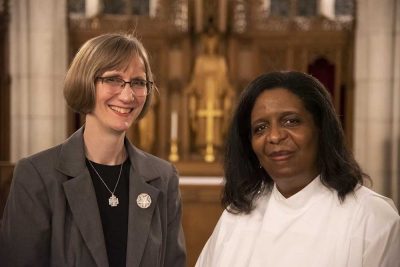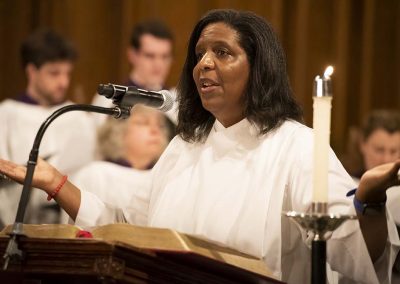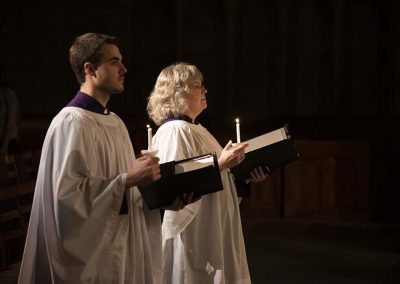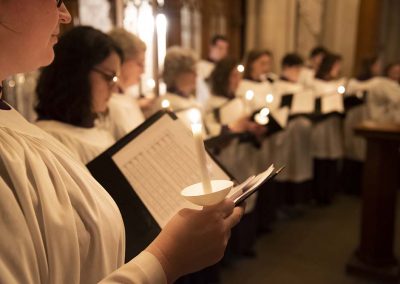From the C-Suite to the Congregation
Field Education helped M.Div. student use leadership gifts in ministryBefore enrolling in the master of divinity program at Duke Divinity School, Lynn Holmes had demonstrated her gifts of leadership and administration for years. After earning her law degree from Georgetown Law School, she served as legislative counsel in the U.S. Senate, worked for over 20 years for BellSouth (now AT&T) as a legislative lobbyist and assistant vice president of ethics and compliance. She was also the chair and administrator for the N.C. Employment Security Commission, and has been a visiting professor at Duke’s Sanford School of Public Policy for five years.
The Call to Ministry
Holmes had been involved in local church ministries and served on several nonprofit and community boards, but she felt God calling her to pursue theological training. “I was clear that I wanted to attend a seminary that was associated with the church and had a reputation for scholarly rigor,” she said. “During my decision-making process, I considered several schools and ultimately determined that Duke Divinity School’s stated goal of preparing leaders to serve the church and live out God’s call connected with my ministry interests.”
“I wanted the experience of serving in a church that was different culturally from my own church background. I have always been in the African-American church tradition and believed that my ministry would benefit from a broader exposure.”
— Holmes
Holmes’s experience in the government and corporate sectors has connections to her call to ministry. “My interests are around the intersection of faith and public policy as well as Christian education and executive and administrative ministry,” she said. “My gifts are in the areas of teaching and administration, and executive ministry is an emerging role in the local church. The trends point toward a focus on persons with both business and theological training as well as an ability to help with teaching responsibilities.”
In addition to rigorous academics, Holmes chose Duke Divinity School because of the mandatory field education components required for all M.Div. students. “This signaled to me the Divinity School’s emphasis on the importance of practical ministry preparation,” she said. She is currently serving in a field ed placement with the Congregation at Duke University Chapel, supervised by pastor Rev. Dr. Carol Gregg. As part of her placement, Lynn has taught an adult Bible study class, assisted with worship services, participated in pastoral care, and met regularly with the lay mentoring committee.
“The Congregation is a unique entity associated with the chapel, a church-within-a-church,” Lynn said. “I believe it is one of the best-kept secrets on Duke’s campus! The placement provides the best of two worlds: serving a local church fellowship along with the opportunity to participate in the ministry of Duke Chapel. I wanted the experience of serving in a church that was different culturally from my own church background. I have always been in the African-American church tradition and believed that my ministry would benefit from a broader exposure.”
“Field education offers students a variety of ways in which to explore their call to ministry,” says the Rev. Rhonda Parker, senior director of ministerial formation and student life. “Partners like the Congregation at Duke Chapel call students to engage in learning and serving in specialized contexts and aid in their vocational discernment.”

Holmes is serving in a field ed placement with the Congregation at Duke Chapel, supervised by pastor Rev. Dr. Carol Gregg (left).
From her experience at the Congregation, Lynn has worked in a range of ministry areas, gained insight into a different church tradition, and been guided throughout her discernment process by her supervising pastor and lay mentoring committee. “One of the bonuses in this placement is the opportunity to work with a woman pastor/leader as my supervisor,” she said. “It has been a joy to work with Pastor Carol, and I have especially appreciated learning from her the importance of intentional and detail-oriented pastoral care. I believe the cross-cultural and broadening experiences will prepare me for more effective, bridge-building ministry.”
Ed. Note: Holmes graduated in May 2019 and has joined the Divinity School Board of Visitors.
Field Education at Duke Divinity School
In 2018, Duke Divinity School made 435 field ed placements and provided stipends to students in excess of $3.3 million. Placements were distributed as follows:
%
Churches
%
Clinical Pastoral Education
%
Nonprofit Ministries
%



